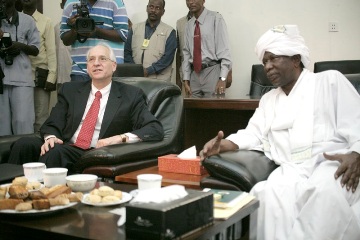Sudan accuses US of seeking to open ‘gate from hell’ over Abyei referendum
September 14, 2013 (KHARTOUM) – Sudan’s foreign minister Ali Ahmed Karti has lambasted the United States and accused it of trying to open a “gate from hell” between Sudan and South Sudan over the disputed area of Abyei, saying that the newly appointed envoy Donald Booth is not welcome to mediate on the issue.

The AU proposal states that only those residing permanently in the area would be allowed to vote in the plebiscite and decide whether they want to join Sudan or South Sudan.
This proposal would effectively make the majority of voters come from the Dinka Ngok tribe, aligned with South Sudan, thus putting the Arab Misseriya nomads, who spend several months in Abyei every year grazing, outside the voting population.
The Sudanese government however, swiftly rejected the AU plan and insisted that the Misseriya should be allowed to participate in the referendum.
Karti, who was speaking to reporters in Khartoum airport prior to leaving for a conference on Somalia in Brussels said that his government will not allow the US to use Abyei as a “thorn in the throat” of Sudan and South Sudan and pointed out that Washington is not qualified for determining Sudan’s relations with other countries.
The visibly angry foreign minister stressed that Sudan will not allow the US envoy to mediate over the Abyei issue and accused Washington of trying to exploit the only remaining issue of the 2005 Comprehensive Peace Agreement (CPA) to sour relations between Khartoum and Juba.
He told reporters that president Omer Hassan Al-Bashir and South Sudan president Salva Kiir Mayardit, have agreed in their recent meeting in Khartoum on setting up the civil and police institutions in Abyei and make the transitional arrangement, accusing unnamed parties in Juba of by bringing up the issue of Abyei.
The Sudanese top diplomat downplayed statements issued by leading figures in South Sudan on Abyei and said it is being made for “local consumption”.
He was likely referring to statements made by former cabinet affairs minister Deng Alor who hails from Abyei.
“We must be united so that we make strong position for the conduct of the referendum. We need to speak to international community, particularly the African Union to put enough pressure on Sudan to accept the September 21, 2012 proposal on resolution of the final status of Abyei. This was the proposal which the African leaders accepted as a solution to the African problem. So African Union must push Sudan to respect decision of the African Union”, Alor said Friday.
“There is nothing which our people did not do for the international community not to respect their choice. Despite the suffering as the result of the continued violations of number of agreements, they decided to show respect and peacefully followed all the legal avenues beginning with negotiations which culminated to the agreement on Abyei, which is now the basis of the resolution”, Alor said in reference to the protocol on the resolution of Abyei.
Karti emphasised that Khartoum would only allow the AU mediation to work on the Abyei dispute stressing that Booth should be confined to improving relations between Sudan and South Sudan.
Booth held a long meeting with Al-Khair Al-Fahim, the Sudanese Co-Chair of the Abyei Joint Oversight Committee and discussed the AU’s proposal for solving the issue.
He told reporters following the meeting that he came to understand and evaluate the status of the Misseriya tribe and their views for solving the issue of Abyei besides Sudan’s government standing and described the Abyei issue as “intricate”, stressing that he will focus on the outstanding issues between Juba and Khartoum besides the Sudanese-American relations.
Al-Fahim, for his part, said he told Booth that Sudan supports a referendum based on international treaties, and protocols and conventions agreed upon by the two countries not a unilateral referendum by South Sudan.
In another issue, Karti announced that the government will not negotiate with the rebel Sudanese People’s Liberation Movement/North (SPLM-N), saying that they will only recognise and negotiate with those elected by the people of the Blue Nile and South Kordofan states.
Last April, the first round of talks between the SPLM-N and the Sudanese government since 2011 in the Ethiopian capital Addis Ababa under the auspices of the African Union (AU) has adjourned without success in achieving any breakthrough.
The United Nations Security Council (UNSC) issued resolution 2046 in May 2012 demanding Sudan and the SPLM-N engage in direct talks in order to end the conflict in the two regions.
Under the resolution, the two parties are supposed to negotiate on the basis of the 28 June 2011 agreement they signed in Addis Ababa before it was scrapped by president Bashir.
(ST)
